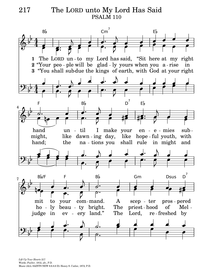Traditionally ascribed to David (Matt. 22:43-45), this was most likely a coronation psalm for the Davidic kings. The two authoritative words, or oracles, from God (vv. 1, 4) maybe echoes of the covenant made with David concerning his dynasty (2 Sam. 7; Ps. 89: 1-37). The first of these oracles proclaims the sure triumph of the LORD's anointed (st. 1) and the refreshing dedication of the king's servants. The second oracle proclaims the king's enduring priesthood "in the order of Melchizedek" (st. 2; see Heb. 5:6,10; 7:15-22)–perhaps because the king in Jerusalem was responsible for building and maintaining the temple, for overseeing the work of the priests and Levites there, and for interceding for the nations. This blessed king would rule all the nations, judge them, and know unfailing vigor in his exalted eternal reign (st. 3).
The New Testament uses Psalm 110 more than any other in reference to Jesus Christ as the anointed King filling this role. The versification (altered) is from the 1912 Psalter.
A proclamation of the sure triumph and unfailing reign of the LORD s anointed, the priest-king son of David.
Scripture References:
st. 1 =vv. 1-2
st. 2 =vv. 3-4
st. 3 = vv. 5-7
Traditionally ascribed to David (Matt. 22:43-45), this was most likely a coronation psalm for the Davidic kings. The two authoritative words, or oracles, from God (vv. 1, 4) maybe echoes of the covenant made with David concerning his dynasty (2 Sam. 7; Ps. 89: 1-37). The first of these oracles proclaims the sure triumph of the LORD's anointed (st. 1) and the refreshing dedication of the king's servants. The second oracle proclaims the king's enduring priesthood "in the order of Melchizedek" (st. 2; see Heb. 5:6,10; 7:15-22)–perhaps because the king in Jerusalem was responsible for building and maintaining the temple, for overseeing the work of the priests and Levites there, and for interceding for the nations. This blessed king would rule all the nations, judge them, and know unfailing vigor in his exalted eternal reign (st. 3).
The New Testament uses Psalm 110 more than any other in reference to Jesus Christ as the anointed King filling this role. The versification (altered) is from the 1912 Psalter.
Liturgical Use:
Ascension (see also 47, 93, and 99).
--Psalter Hymnal Handbook


 My Starred Hymns
My Starred Hymns



